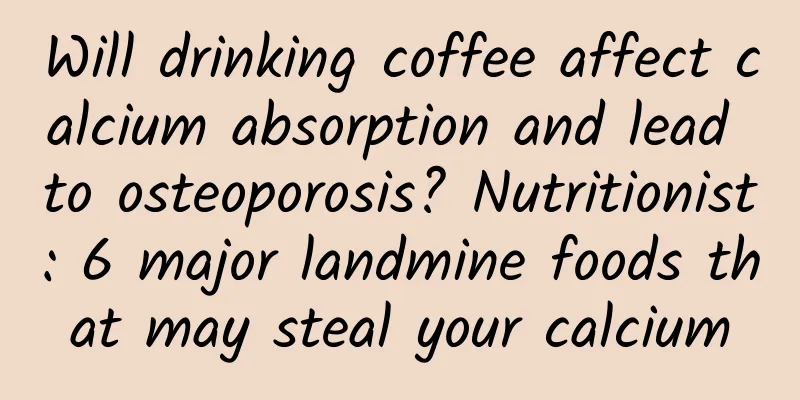Will drinking coffee affect calcium absorption and lead to osteoporosis? Nutritionist: 6 major landmine foods that may steal your calcium

|
Latte coffee is a great way for many busy office workers to supplement calcium and refresh themselves. However, there is a rumor on the Internet that "caffeine can affect calcium absorption and lead to osteoporosis." Is it true that the combination of coffee and milk cannot provide the body with the calcium it needs? What foods will steal calcium? Let’s hear what nutritionist Yu Zhuqing has to say. Long-term insufficient calcium intake can easily lead to osteoporosisNutritionist Yu Zhuqing said that calcium is not only a key nutrient for maintaining strong bones, but is also responsible for regulating physiological functions such as the transmission of key signals in the body's muscles and nerves. When calcium intake is insufficient and the calcium concentration in the blood is too low, the body will break down the calcium in the bones and release it into the blood to maintain normal physiological functions. Therefore, if calcium intake is insufficient for a long time and bone loss is excessive, the bones may become fragile and brittle, leading to osteoporosis. Eating ≠ absorbing, 6 foods affect calcium absorptionEveryone knows that calcium supplementation requires calcium-rich dairy products such as cheese, milk, cheese, and yogurt. However, nutritionist Yu Zhuqing points out that not every bite of calcium eaten will be absorbed smoothly. If you are a "heavy coffee addict" who feels uncomfortable without coffee, or a "meat eater" who cannot live without meat, or a "salty eater" who cannot swallow food without seasoning, all of these factors will greatly affect the calcium absorption rate. Nutritionist Yu Zhuqing said that the Ministry of Health and Welfare recommends that adults consume 1,000 mg of calcium per day. If you want to properly supplement calcium and have "bone" strength, quickly take a look at what are the landmines that take away precious calcium in your diet: Calcium supplementation minefield 1: Caffeinated beverage addiction Many office workers love to drink coffee, tea and other refreshing drinks, the caffeine in them does affect the absorption of calcium and accelerate calcium loss. Therefore, it is recommended that daily caffeine intake should not exceed 300 mg to avoid affecting calcium absorption. It is recommended that daily caffeine intake should not exceed 300 mg to avoid affecting calcium absorption. Calcium supplement landmine 2: Meat-free A moderate intake of protein helps calcium absorption, but if you are a person who eats a lot of meat and fish at every meal and cannot live without meat, it is easy to increase the excretion of calcium in the urine. In addition, high-protein foods are usually high in phosphorus. Too much phosphorus in the blood will accelerate the release of bone calcium into the blood, leading to bone loss. It is recommended that the daily protein intake of an average adult can be calculated as "1 gram per 1 kilogram". Taking an adult weighing 60 kg as an example, the recommended daily protein intake is 60 grams, about 4 to 5 servings. Each serving of protein is about 1 piece of meat that is 3 fingers wide and thick, 1 egg, half a box of tender tofu, 2 grids of traditional tofu, or 1 cup of 240cc soy milk. Calcium supplementation landmine 3: Eating too much salt Eating too much salt (sodium) will increase the loss of calcium in the urine, which is not only harmful to the bones, but also increases the risk of urinary stones. It is recommended that adults should not consume more than 2000 mg of sodium per day, which is about 5 grams of salt in a level teaspoon. Calcium supplementation minefield 4: Drinking carbonated beverages endlessly Carbonated drinks have a high phosphorus content. If you drink carbonated drinks to quench your thirst when you are thirsty, not only will your body not be able to replenish water, but the excessive phosphorus intake will also cause an imbalance in the ratio of phosphorus to calcium in the blood, hindering calcium absorption and increasing calcium loss. If you drink carbonated drinks to quench your thirst when you are thirsty, not only will your body not be able to replenish water, but the excessive phosphorus intake will also cause an imbalance in the ratio of phosphorus to calcium in the blood, hindering calcium absorption and increasing calcium loss. Calcium supplementation minefield 5: High iron foods Since the carriers that the body uses to absorb calcium and iron, that is, the drivers responsible for transporting nutrients to cells, are the same, when iron and calcium are eaten at the same time, the drivers will compete for transportation and it is impossible to take care of both. For people who want to supplement calcium specifically, it is best to eat high-iron foods 2 hours apart. Calcium supplementation minefield 6: Vegetables containing oxalic acid and phytic acid Vegetable foods usually contain phytic acid and oxalic acid. These substances will combine with calcium in the intestines to form calcium salts. The body cannot absorb and utilize them and will be excreted from the body, hindering calcium absorption. [Nutritionist's Tips]: In order to have strong bones, in addition to taking in calcium in moderation and eating less foods that hinder calcium absorption, you should also avoid bad habits such as being underweight, repeated weight loss, smoking, and staying up late. In addition, moderate sun exposure and vitamin D intake can help calcium be absorbed and stored smoothly; regular exercise such as skipping rope, climbing stairs, jogging, brisk walking and other weight-bearing exercises can increase bone density and lock calcium in the bones. |
Recommend
Yunlin sampled 13 ice cream and cold drinks that did not comply with regulations
Eating ice cream in the summer is refreshing and ...
Three dietary prescriptions for patients with functional uterine bleeding of different constitutions
Dysfunctional uterine bleeding is classified as &...
Is uterine effusion a disease?
Uterine effusion may be physiological or patholog...
How much do you know about the precautions for treating cervical hypertrophy?
It is very important for patients to understand a...
The first sure-fire way to lose weight: Tryptophan foods control appetite
Still playing tug of war with the number on the s...
What to do with chronic pelvic inflammatory disease and low back pain
What to do if you have chronic pelvic inflammator...
How is congenital absence of vagina diagnosed?
I believe that many people do not know much about...
The main cause of cervical hypertrophy and congestion
Cervical hypertrophy is a disease that women ofte...
What is the cause of habitual miscarriage? Pay attention to these 7 problems
There are many reasons for habitual miscarriage, ...
How long after an artificial abortion can you have sex? Let's analyze it in detail.
Artificial abortion refers to the need for aborti...
Diagnosis of vulvar leukoplakia
Many female friends are afraid of vulvar leukopla...
Let's learn about the symptoms of acute pelvic inflammatory disease
Pelvic inflammatory disease mainly refers to the ...
To lose weight, start the fire of rapid metabolism first! Master the five driving forces of repairing metabolism
Haley, a well-known American nutritionist. The Fa...
How does TCM treat cervical erosion? Two secret recipes of TCM for treating cervical erosion
Cervical erosion is a common gynecological diseas...
Eating green coffee and potatoes for breakfast can double your weight loss? Doctor: Overdosage may lead to three major risks of osteoporosis
Internet rumor: "Drinking green coffee for b...









